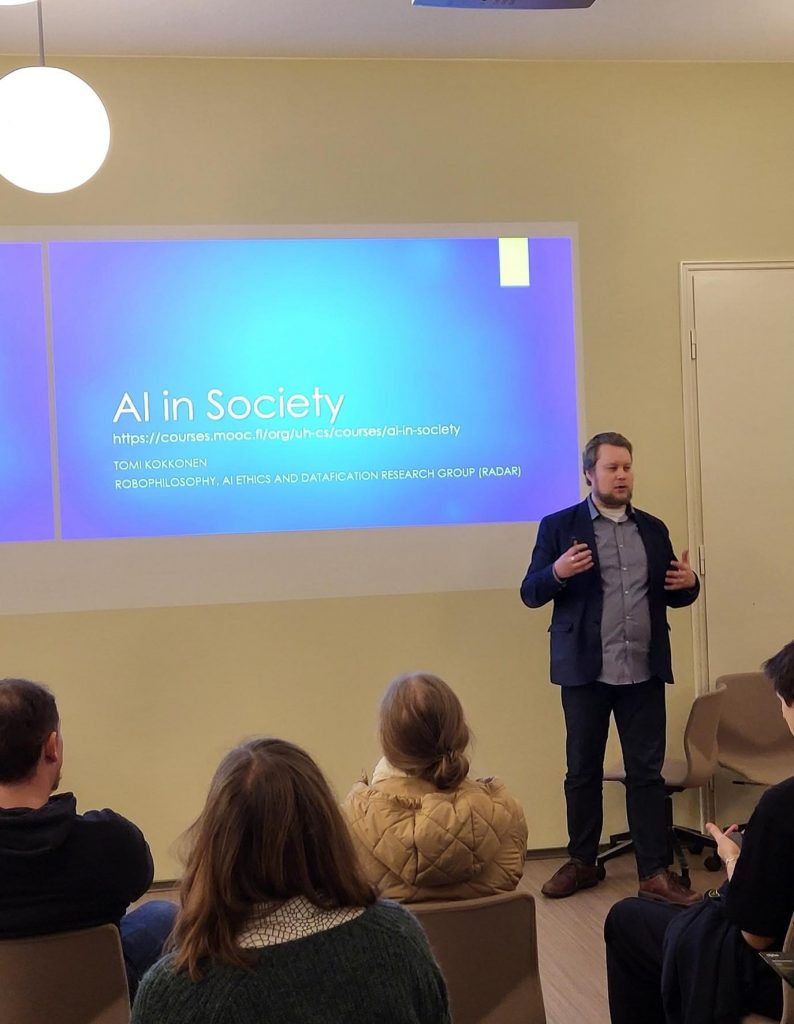This blog post is written by our LTF member Saana:
Time passes by ever so quickly and we are drawing near to the end of the third period of the academic year. However, it is never too late to take a little look into the past and reflect on it – especially when the theme of the discussion is trendy and thought-provoking artificial intelligence (or more familiarly: AI).
Una Europa took part in the Night of Science on the 12th of January and invited a set of interdisciplinary speakers to discuss AI from the perspective of humanities and social sciences with the headline ‘Fact or fiction: Will AI save us?’. Did our panel find the answer to this profound question? Well, I guess you must keep reading.
 So many people attended!
So many people attended!
The evening kicked off with an introduction to Una Europa MOOC: AI in Society by researcher Tomi Kokkonen. MOOC: AI in Society is a multidisciplinary online course about AI and how it creates challenges within our society. The course views the issues and questions from several points of view like justice, health care and democratic participation, among others. Kokkonen pointed out that as the influence of AI in our society increases, the wider public also needs literacy and deeper understanding of AI. And it is the aim of this MOOC course to make more people more aware of the effects of AI in society.
 Tomi Kokkonen giving a representation on MOOC: AI in Society.
Tomi Kokkonen giving a representation on MOOC: AI in Society.
After Kokkonen’s introduction, the evening’s panel could start. But first things first, let me introduce to you our panelists:
-
- Jaana Hallamaa, Professor of Social Ethics & Deputy Director in ETAIROS project
- Raul Hakli, Senior Researcher in Practical Philosophy & co-leader of RADAR
- Anna-Mari Rusanen, Senior Lecturer in Cognitive Science, AI in Education
- The moderator of the panel: Jukka Nurminen, Professor of Computer Science
 From the left: Tomi Kokkonen, Jaana Hallamaa, Raul Hakli, Anna-Mari Rusanen and Jukka Nurminen
From the left: Tomi Kokkonen, Jaana Hallamaa, Raul Hakli, Anna-Mari Rusanen and Jukka Nurminen
Discussion between the panelists and the audience was very lively and the theme brought up several intriguing questions. First, the panelists started thinking about the headline question, and Rusanen pointed out that the question should rather be: “Will the AI developers save us?” – because after all AI is still “only” a tool.
Hallamaa mentioned that when using tech and AI, a person becomes firstly a subject: user of tech, secondly an object: at the mercy of different applications, and thirdly data: raw material. This is an interesting point of view when we discuss AI as a tool – in a way, a person also becomes a tool. The roles that we play and the rules that are given to us can be difficult to map out as humans according to Hallamaa.
Rakli joined in the conversation by wondering if there really is something new to the fact that we have this new tool called AI? Throughout history people have developed new tools and ways of working, which have further created new jobs. Rakli also talked about the more dangerous side of AI: AI systems go deep into things that are typical to human beings and essentially human. These things are, for example, thinking and reasoning. Might we therefore start to lose our skill to use our brains? Do we become dumb because we don’t use the muscle inside the skull?
To this Rusanen answered that the history of humankind is a history of development of tools. Tools have always extended our skills. For example, writing extended memory, eyeglasses extended senses, and so on. According to Rusanen, we do not necessarily become dumber because of the tools, they rather extend our skills. However, AI does bring challenges to the education system: we need to teach the children how to use new technologies in a meaningful way.

Our audience got to write down some questions. However, the discussion was so lively that we didn’t need them in the end!
These were only little snippets from an extremely interesting evening. Our panelists didn’t solve the question of saving the world, but it is certain that the discussion gave everyone lots of food for thought.
Are you curious about the role of AI in society? Learn more in the Una Europa MOOC course!

